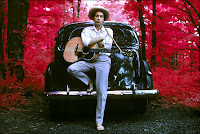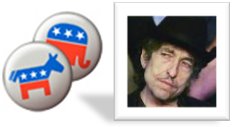We sit beside bridges and walk beside fountains,
Catch the wild fishes that float through the stream,
Time passes slowly when you're lost in a dream.
Over the past few weeks, there have been
 no shortage of articles written about the 40th anniversary of Woodstock. And certainly one of the most interesting is Jon Pareles’ story that appeared in Sunday’s New York Times two weeks ago.
no shortage of articles written about the 40th anniversary of Woodstock. And certainly one of the most interesting is Jon Pareles’ story that appeared in Sunday’s New York Times two weeks ago.Ironically, what made the article so striking wasn’t so much
 what was said about the Woodstock generation of 1969; it’s what wasn’t said about the Obama Nation of 2009. As Pareles observes: “Woodstock was as much an endpoint as a beginning, a holiday of naïveté and dumb luck before the realities of capitalism resumed.”
what was said about the Woodstock generation of 1969; it’s what wasn’t said about the Obama Nation of 2009. As Pareles observes: “Woodstock was as much an endpoint as a beginning, a holiday of naïveté and dumb luck before the realities of capitalism resumed.”And while he draw no direct parallels drawn
 between the 400,000 people who went up the country 40 years ago August 1969, and the two million people who descended on the National Mall this past January, the correlation certainly exists. Just don’t expect the White House to make the connection anytime soon.
between the 400,000 people who went up the country 40 years ago August 1969, and the two million people who descended on the National Mall this past January, the correlation certainly exists. Just don’t expect the White House to make the connection anytime soon. For the hundreds of thousands who stormed the gates of Yasgur’s farm, Woodstock was always more than a 3-day music and arts festival. For them, it was a movement that had been growing for the better part of a decade. And by the time they got to Woodstock, they were literally a half a million strong.
For the hundreds of thousands who stormed the gates of Yasgur’s farm, Woodstock was always more than a 3-day music and arts festival. For them, it was a movement that had been growing for the better part of a decade. And by the time they got to Woodstock, they were literally a half a million strong.But it wasn’t just the artists and attendees
 who viewed Woodstock through rose-colored glasses. Thanks to the film released by Warner Bros. the following year, that’s the way most of the world saw it, too.
who viewed Woodstock through rose-colored glasses. Thanks to the film released by Warner Bros. the following year, that’s the way most of the world saw it, too. Of course in process of condensing 72 hours into a 4-hour film the studio would release, a lot was left on the cutting room floor. And it’s those forgotten pieces that tell not only the real story of Woodstock, but offer a cautionary tale for the newly anointed president.
Of course in process of condensing 72 hours into a 4-hour film the studio would release, a lot was left on the cutting room floor. And it’s those forgotten pieces that tell not only the real story of Woodstock, but offer a cautionary tale for the newly anointed president.So enamored are we with the mythology of Woodstock that we tend to overlook the fact that
 the promoters of the fabled 3-day festival completely lost control of their creation. The result? The site was declared a national disaster site less than a day into the event. And while Obama had the winds of generational change at his back last November, he, too, has walked smack dab into a national disaster. And just as the concert promoters had to be bailed out by the federal government, the Obama Nation has suffered
the promoters of the fabled 3-day festival completely lost control of their creation. The result? The site was declared a national disaster site less than a day into the event. And while Obama had the winds of generational change at his back last November, he, too, has walked smack dab into a national disaster. And just as the concert promoters had to be bailed out by the federal government, the Obama Nation has suffered the same fate to the tune of of a $787 stimulus package intended to assauge the beleaguered economy. The only difference is that while the Woodstock crowd got a free concert, the Wall Street looters who brought this country to its knees are the ones who got a free ride.
the same fate to the tune of of a $787 stimulus package intended to assauge the beleaguered economy. The only difference is that while the Woodstock crowd got a free concert, the Wall Street looters who brought this country to its knees are the ones who got a free ride.And what about the corporate greed? Again, the similarities abound.
In the case of Woodstock, the moment the contact high wore off, the feel-good euphoria
 sparked in those three days of peace, love and understanding immediately gave way to a perpetual commoditization. Not only the sense of community Woodstock engendered, but an endless quest to commoditize the Woodstock name itself.
sparked in those three days of peace, love and understanding immediately gave way to a perpetual commoditization. Not only the sense of community Woodstock engendered, but an endless quest to commoditize the Woodstock name itself. Similarly, Barack Obama has suffered the same fate. His name, his likeness, his promise to renew our faith in our government and ourselves has become fodder for a seemingly endless supply of T-shirts, bumper stickers and faux campaign buttons.
Similarly, Barack Obama has suffered the same fate. His name, his likeness, his promise to renew our faith in our government and ourselves has become fodder for a seemingly endless supply of T-shirts, bumper stickers and faux campaign buttons.  Said another way, in the months since his election, Barack Obama has become more than a president; he has become a brand. The commoditization of the Obama Nation has begun.
Said another way, in the months since his election, Barack Obama has become more than a president; he has become a brand. The commoditization of the Obama Nation has begun.Just as that iconic image of that lone white dove on the guitar neck will always evoke a sense of idyllic idealism,
 Shepard Fairey’s equally iconic image of Barack Obama will be used for generations to come to evoke a similar sense of sanguine certainty that things will get better.
Shepard Fairey’s equally iconic image of Barack Obama will be used for generations to come to evoke a similar sense of sanguine certainty that things will get better.Much has been made over those who graced the stage at Woodstock. After all, the event wasn't the only thing mythologized over the last 40 years. Similarly, much has also been made of those who did not grace Woodstock with their presence.
Among the biggest stars not to trek through
 the mud and the sludge was Bob Dylan. Apparently, Dylan gave some thought to making an appearance (he was living in the neighboring town at the time, after all). But ultimately, Dylan couldn’t seem to get past his animosity toward the
the mud and the sludge was Bob Dylan. Apparently, Dylan gave some thought to making an appearance (he was living in the neighboring town at the time, after all). But ultimately, Dylan couldn’t seem to get past his animosity toward the  fans who had crowded in on his newly adopted domestic lifestyle by constantly dropping by his house at all hours of the night. Of course, the excuse Dylan himself gave was much more pedantic: his son was sick that day.
fans who had crowded in on his newly adopted domestic lifestyle by constantly dropping by his house at all hours of the night. Of course, the excuse Dylan himself gave was much more pedantic: his son was sick that day.Whether it was overzealous fans or a child on the mend, in the end Dylan probably made the right decision not to attend Woodstock.
Sure, Woodstock transformed many of the artists
 who performed into cultural icons. But by 1969, Dylan was already an icon. And besides, part of the reason Dylan retreated to Woodstock in the first place was to shake that ‘voice of a generation’ label the folkies had pinned on him. What could he
who performed into cultural icons. But by 1969, Dylan was already an icon. And besides, part of the reason Dylan retreated to Woodstock in the first place was to shake that ‘voice of a generation’ label the folkies had pinned on him. What could he  possibly have gained from being lumped in with 400,000 people whose biggest claim to fame 40 years later is that they managed to make it through three days mired in a cow pasture filled with mud and manure?
possibly have gained from being lumped in with 400,000 people whose biggest claim to fame 40 years later is that they managed to make it through three days mired in a cow pasture filled with mud and manure? And so, as we peer through the purple haze of the past and peel back the layers of the Woodstock legacy, perhaps the real legacy of Woodstock has as much to do with excess as with idealism.
And so, as we peer through the purple haze of the past and peel back the layers of the Woodstock legacy, perhaps the real legacy of Woodstock has as much to do with excess as with idealism. Interesting how history really does tend to repeat itself …
Interesting how history really does tend to repeat itself …Time passes slowly up here in the daylight,
 We stare straight ahead and try so hard to stay right,
We stare straight ahead and try so hard to stay right,Like the red rose of summer that blooms in the day,
Time passes slowly and fades away.







1 comment:
Dylan really didn't need to go to Woodstock. And you're right, it's probably better he didn't. You speculate on the reasons why he did not attend...I wonder if anyone knows anything else?
Post a Comment